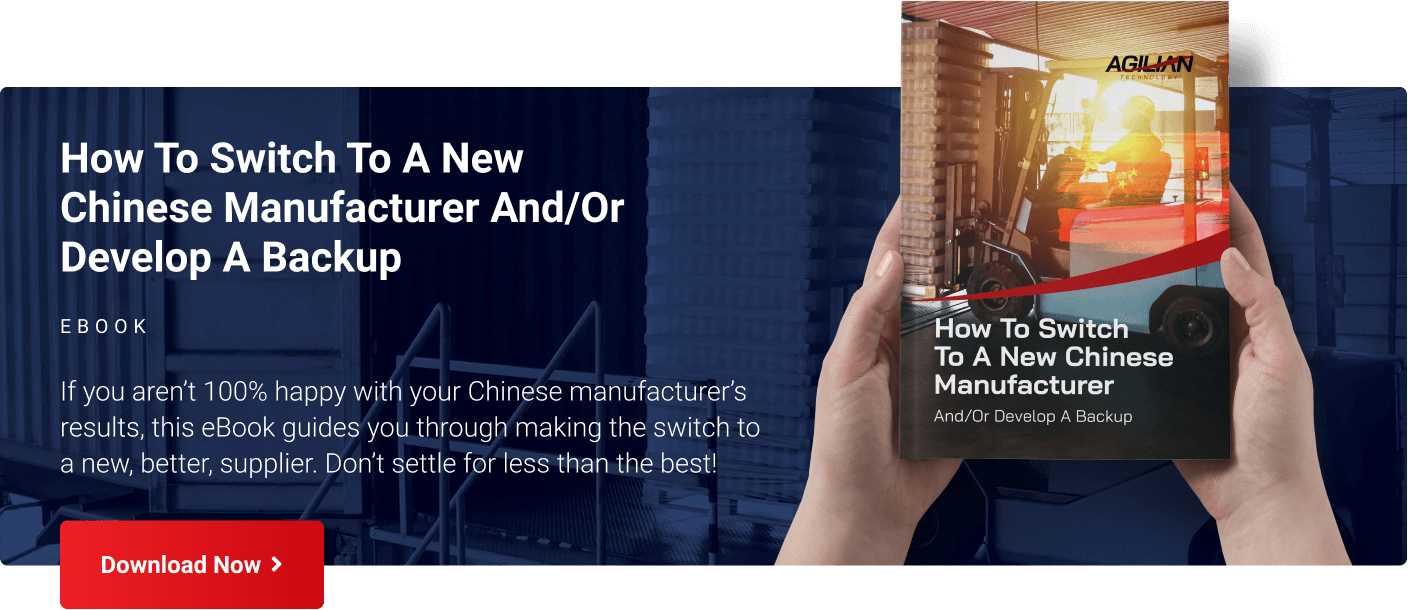Finding a contract manufacturer who’s a good fit is just one part of the process of getting your new product made and to market.
In this post we’ll look at some of the terms you should specifically negotiate when working with a CM.
In general, you should negotiate these terms
Regardless of supplier, if you’re working with a Chinese company to supply or manufacture your products you should negotiate these terms as a part of the sourcing process:
- Total lead time (and shipment date)
- Incoterms
- IP rights and ownership
- Transparency on the manufacturing site (and the permission to visit)
- Quality standard, product specifications, and certifications
- Payment terms
- Responsibility for paying for inspections and laboratory testing
- Penalties (such as for defective pieces, late deliveries, etc)
- and more (read this blog post on QualityInspection.org for more details)
The above should be ‘as standard,’ but what about when working with a Contract Manufacturer?
6 terms to specifically negotiate with a contract manufacturer
Here are the terms that should be specifically negotiated with contract manufacturers. The reason it’s specific to CMs is because other manufacturers, such as an OEM or ODM may actively push back against some of these terms due to them being contrary to their business models (where transparency over costs, who they work with, and how they work is not usually in their interest, for instance).
A CM can/should be able to accept these terms, therefore you should try to negotiate them to have better control over your project:
1. Visibility on the components’ suppliers and prices
Basically, open-book purchasing. This allows you to:
- Visit those suppliers and estimate the risks of failure at different points in your supply chain.
- Go and see a source of delays or quality issues and make up your own mind.
- Add controls or set up a backup where needed.
- Know the details of the price you pay (see next point).
Naturally, if the contract manufacturer has to run a search & qualification project to line up some of these suppliers, you will be requested to pay for that work. But you own all those data, and you can take some of them to another assembler if needed.
2. Pricing structure visibility
The typical Chinese or Vietnamese OEM supplier does not want you to know their pricing structure. It is a business secret, just like their supplier list. And, based on their business model, it makes sense.
A real contract manufacturer has a somewhat different business model. They will break their cost structure down and share it, at least to an extent. And this protects you largely against arbitrary price increases since they will have to bring evidence of a rise in their costs.
3. Very low MOQ
Since you have a better view of their cost structure, and you can see the bill of materials (including the MOQs of each component) of your product, why would a CM impose an MOQ on you?
The logical solution, if you place orders that are individually very low and if the procurement of inputs is not a constraint, is for the assembly factory to charge a fixed setup fee. That fee should reflect their extra cost of setting up the lines, bringing the materials needed, and so on.
(Obviously, a great manufacturer will be looking into ways to reduce the cost of that setup. There are many ways to make changeovers more ‘seamless’, if you place a lot of orders overall.)
4. Contracts directly between your company and the main component suppliers
If your volumes are quite significant, a contract assembler and its suppliers are likely to accept this. It can provide you more protection (especially if that supplier has a lot of assets) in case they provide faulty components. You can sue that supplier directly, in case your direct supplier cannot compensate you for your losses.
Obviously, the best is to work with a great pool of suppliers. And the second best thing is to detect and stop those defective materials before the assembly starts. Unfortunately, in some cases, a bad product might find its way all the way to the market, and it might cost your company a lot of money…
5. Resources for new product development
A common complaint when working with a CM is that their project managers sometimes get very busy because of urgent requests from their top customers. And all the (relatively) small customers have to wait.
You need to be sure your project manager will be able to dedicate at least X hours a week to your developments and on your orders. And you might need to do the same for some key resources (e.g. process engineers etc.).
6. Ability to spread production in several countries in the mid-to-long-term
This is probably not something you need to negotiate from the get-go, but it is something you can probably inquire about. One of the typical CM’s key competencies is to structure its customers’ supply chains. If you are based in the USA and you know you will need to diversify your manufacturing countries after a while, make sure you work with people who are planning to offer that to their customers.
A word of warning about Western companies claiming to be Contract Manufacturers
Many buyers understandably feel more comfortable dealing with a Western-owned contract manufacturer in China. However, be wary of them, as even when talking to a non-Chinese rep, you need to do the same due diligence as you would with a Chinese-owned company.
We have come across a number of Western-owned trading companies that pretend to own a factory. Their whole website may show details of a manufacturing facility…but it turns out that it’s actually owned by Chinese parties.
How happy would you be if it turned out you paid an extra margin to the Western trading company than you would if going direct to the manufacturer and didn’t have the benefits of working with a foreign-owned factory?
What’s next?
✅ If you are still wondering how to find a CM, head to this page: List of Contract Manufacturers in China.
✅ And, if you need advice on the way to pick the best CM, read this article: 5 Tips To Select a Great Contract Manufacturer in China or Vietnam.
Disclaimer
Here at Agilian, we are not lawyers. What we wrote above is based only on our understanding of the legal requirements. We do not present this information as a basis for you to make decisions, and we do not accept any liability if you do so. Consider consulting a lawyer before making legal decisions.
Editor’s note: This article is based on this blog post from QualityInspection.org and has been adjusted and republished here for Agilian readers.
What if you need to move away from your current manufacturer who’s been disappointing you?
If your Chinese manufacturer is giving you poor quality, late deliveries, unexpected price rises, or other problems, it’s time to find a better option!
This eBook, drawing on our decades of dealing with Chinese suppliers and manufacturing in China ourselves for various customers, will help introduce why you will benefit from switching and how to make the transition in an orderly and secure manner.
Hit the button below to download your copy:





